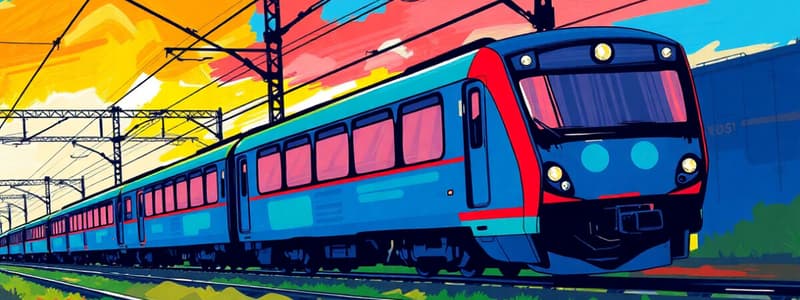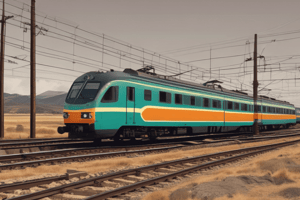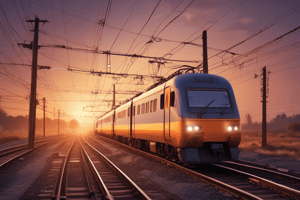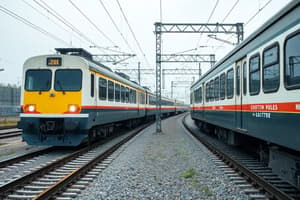Podcast
Questions and Answers
What is a critical consideration for designing overhead equipment (OHE) on through girder bridges?
What is a critical consideration for designing overhead equipment (OHE) on through girder bridges?
- Design should ignore potential future modifications.
- Support locations must be defined during the survey. (correct)
- Only the alignment of the bridge is relevant.
- The design must prioritize aesthetics over functionality.
In tunnel designs for OHE, what is an important factor to ensure headroom?
In tunnel designs for OHE, what is an important factor to ensure headroom?
- Long spans between supports are preferred.
- High-temperature tolerance of materials is not necessary.
- Anticreeps and overlaps should be placed within the tunnel.
- Spans should be kept short. (correct)
What should be done prior to finalizing OHE design in tunnels?
What should be done prior to finalizing OHE design in tunnels?
- Ignore civil engineering restrictions.
- Establish a single universal design for all tunnels.
- Only focus on aesthetic designs.
- Assess seasonal temperature effects in the tunnel. (correct)
How should the design for OHE account for potential yard remodelling works?
How should the design for OHE account for potential yard remodelling works?
When marking out the locations for track construction, which professional should coordinate with the OHE design engineer?
When marking out the locations for track construction, which professional should coordinate with the OHE design engineer?
What is the main purpose of modifying existing power supply arrangements in railway electrification?
What is the main purpose of modifying existing power supply arrangements in railway electrification?
Which of the following factors influences the choice of power supply system for railway electrification?
Which of the following factors influences the choice of power supply system for railway electrification?
In the context of signal and telecommunications in railway electrification, what does 'immunization' refer to?
In the context of signal and telecommunications in railway electrification, what does 'immunization' refer to?
What type of alterations might be needed for civil engineering when implementing a 25 kV AC system in railway electrification?
What type of alterations might be needed for civil engineering when implementing a 25 kV AC system in railway electrification?
What key aspect is essential for the successful implementation of railway electrification projects?
What key aspect is essential for the successful implementation of railway electrification projects?
Which facility type is directly related to the maintenance of electric locomotives?
Which facility type is directly related to the maintenance of electric locomotives?
What is a consequence of implementing a 2 X 25 kV Auto Transformer system in railway electrification?
What is a consequence of implementing a 2 X 25 kV Auto Transformer system in railway electrification?
What does the Break Even Level of traffic density refer to?
What does the Break Even Level of traffic density refer to?
What factor is NOT mentioned as a benefit of electric traction compared to diesel traction?
What factor is NOT mentioned as a benefit of electric traction compared to diesel traction?
When was the electrification of the Howrah-Burdwan section completed?
When was the electrification of the Howrah-Burdwan section completed?
What was the common system of supply used for electric traction by the 1930s?
What was the common system of supply used for electric traction by the 1930s?
What major infrastructure was a requirement for electric traction systems?
What major infrastructure was a requirement for electric traction systems?
What was a major disadvantage of earlier electrification efforts discussed?
What was a major disadvantage of earlier electrification efforts discussed?
Which of these cities in India had electrified suburban sections by 1930?
Which of these cities in India had electrified suburban sections by 1930?
What was one of the main reasons for the increased traffic over electrified sections?
What was one of the main reasons for the increased traffic over electrified sections?
How was power generated for electrified railway sections in India mentioned?
How was power generated for electrified railway sections in India mentioned?
What is the maximum distance permissible from the centre of turnout to the contact wire for the track with a turnout of 1 in 12?
What is the maximum distance permissible from the centre of turnout to the contact wire for the track with a turnout of 1 in 12?
How much horizontal separation is required between two contact wires at the support to prevent interference?
How much horizontal separation is required between two contact wires at the support to prevent interference?
What is the required staggering distance towards the main track for the contact wire at a turnout?
What is the required staggering distance towards the main track for the contact wire at a turnout?
What is the minimum distance an OHE structure should be placed behind a signal?
What is the minimum distance an OHE structure should be placed behind a signal?
In the turnout of 1 in 20, what is the distance from the centre of the turn-out to the toe?
In the turnout of 1 in 20, what is the distance from the centre of the turn-out to the toe?
What is the minimum separation required between two contact wires for optimal performance?
What is the minimum separation required between two contact wires for optimal performance?
What does the curvature on a turn-out require for staggering?
What does the curvature on a turn-out require for staggering?
For which track turnout is the maximum distance from the centre of the turnout to the nose least?
For which track turnout is the maximum distance from the centre of the turnout to the nose least?
What is the maximum separation from the centre of turnout to the contact wire on the main track for a turnout of 1 in 16?
What is the maximum separation from the centre of turnout to the contact wire on the main track for a turnout of 1 in 16?
Which of the following describes a requirement for an OHE structure's location in relation to a signal?
Which of the following describes a requirement for an OHE structure's location in relation to a signal?
What is the minimum setting distance for the first Semaphore signal in a series of five?
What is the minimum setting distance for the first Semaphore signal in a series of five?
How far in advance of the stop signals must colour light signals be located?
How far in advance of the stop signals must colour light signals be located?
What is the maximum tension length for regulated OHE?
What is the maximum tension length for regulated OHE?
When are insulated overlaps located?
When are insulated overlaps located?
What must be ensured on curved tracks for positioning structures?
What must be ensured on curved tracks for positioning structures?
What is the maximum tension length of conductors for unregulated OHE?
What is the maximum tension length of conductors for unregulated OHE?
What is necessary if the insulated overlap is on a curve with a radius of 5000 m or sharper?
What is necessary if the insulated overlap is on a curve with a radius of 5000 m or sharper?
What distance limits the clearance between the brackets for a central 4 span insulated overlap?
What distance limits the clearance between the brackets for a central 4 span insulated overlap?
Who should finalize the setting distances and lanes for OHE structures on curved tracks?
Who should finalize the setting distances and lanes for OHE structures on curved tracks?
What is the required setting distance for the second Semaphore signal in the series?
What is the required setting distance for the second Semaphore signal in the series?
What is primarily recorded on the Pegging Plan during the finalization of the OHE layout?
What is primarily recorded on the Pegging Plan during the finalization of the OHE layout?
Which plan is created as an 'As completed' plan for maintenance organization after the OHE construction is finished?
Which plan is created as an 'As completed' plan for maintenance organization after the OHE construction is finished?
What is the purpose of evaluating electromagnetic and electrostatic induction for overhead distribution lines?
What is the purpose of evaluating electromagnetic and electrostatic induction for overhead distribution lines?
During the OHE layout planning process, what is the significance of the staggers of contact wire?
During the OHE layout planning process, what is the significance of the staggers of contact wire?
What specific information does the OHE Layout Plan provide regarding the conductor run?
What specific information does the OHE Layout Plan provide regarding the conductor run?
What is the purpose of the foot by foot survey in railway electrification projects?
What is the purpose of the foot by foot survey in railway electrification projects?
What is the scale used for longitudinal view on the survey sheets for open routes?
What is the scale used for longitudinal view on the survey sheets for open routes?
What document is essential for guiding the designs of Overhead Equipment Layout?
What document is essential for guiding the designs of Overhead Equipment Layout?
What is referred to as the final plan that incorporates modifications based on site conditions?
What is referred to as the final plan that incorporates modifications based on site conditions?
Which of these is not a purpose of maintaining a surveyor's field book?
Which of these is not a purpose of maintaining a surveyor's field book?
Which detail is crucial for the accurate preparation of survey plans?
Which detail is crucial for the accurate preparation of survey plans?
What is critical for the estimation of quantities and cost estimates in railway electrification?
What is critical for the estimation of quantities and cost estimates in railway electrification?
What is the main reason for completing track structure improvements before OHE work?
What is the main reason for completing track structure improvements before OHE work?
What should field sketches ensure during the surveying process?
What should field sketches ensure during the surveying process?
Which standard is referenced for the preparation of survey sheets?
Which standard is referenced for the preparation of survey sheets?
What should each sheet of field sketches ideally represent?
What should each sheet of field sketches ideally represent?
Why is it important for major yards with multiple lines to have special sketch requirements?
Why is it important for major yards with multiple lines to have special sketch requirements?
What is the vertical distance represented by each line on a field sketch for open routes?
What is the vertical distance represented by each line on a field sketch for open routes?
What is a requirement for the drawings prepared from field sketches?
What is a requirement for the drawings prepared from field sketches?
What role does joint inspection with open line officials serve in preparing improvements?
What role does joint inspection with open line officials serve in preparing improvements?
What should be the focus when preparing prepegging plans on survey sheets?
What should be the focus when preparing prepegging plans on survey sheets?
What is the minimum setting distance required for the third Semaphore signal in the series of five?
What is the minimum setting distance required for the third Semaphore signal in the series of five?
For colour light signals, what is the maximum distance specified for placement in advance of a stop signal?
For colour light signals, what is the maximum distance specified for placement in advance of a stop signal?
What is the maximum allowable tension length between the anticreep central mast and the balance weight anchor mast for regulated OHE?
What is the maximum allowable tension length between the anticreep central mast and the balance weight anchor mast for regulated OHE?
What is the main purpose of jointly inspecting the location for OHE structures on curved tracks?
What is the main purpose of jointly inspecting the location for OHE structures on curved tracks?
In the context of overlaps, what is the primary factor considered for inserting uninsulated overlaps?
In the context of overlaps, what is the primary factor considered for inserting uninsulated overlaps?
What requirement is imposed if an insulated overlap is located on a curve with a radius of sharpness of 5000 m or less?
What requirement is imposed if an insulated overlap is located on a curve with a radius of sharpness of 5000 m or less?
What is the maximum tension length permitted for unregulated OHE?
What is the maximum tension length permitted for unregulated OHE?
What condition must be met regarding the distance between brackets for the 4 span insulated overlap?
What condition must be met regarding the distance between brackets for the 4 span insulated overlap?
What is the purpose of locating insulated overlaps at specific sites for sectioning and paralleling posts?
What is the purpose of locating insulated overlaps at specific sites for sectioning and paralleling posts?
Who is responsible for finalizing the setting distances and lanes for OHE structures?
Who is responsible for finalizing the setting distances and lanes for OHE structures?
What initial step should be taken in the preparation of prepegging plans?
What initial step should be taken in the preparation of prepegging plans?
Which of the following details is NOT included in the prepegging plan during site verification?
Which of the following details is NOT included in the prepegging plan during site verification?
When adjusting the location of structures, what is a primary goal?
When adjusting the location of structures, what is a primary goal?
What is the role of anticreep central masts in the prepegging plan?
What is the role of anticreep central masts in the prepegging plan?
What should be done after the prepegging plan is finalized and deemed satisfactory?
What should be done after the prepegging plan is finalized and deemed satisfactory?
How should the prepegging plan be transferred after initial trials?
How should the prepegging plan be transferred after initial trials?
What type of overlapped conductors should be located for supply control posts?
What type of overlapped conductors should be located for supply control posts?
When locating main and loop line cantilevers at a station, what orientation is recommended?
When locating main and loop line cantilevers at a station, what orientation is recommended?
What marking should be clearly indicated on the prepegging plan?
What marking should be clearly indicated on the prepegging plan?
Flashcards
Railway Electrification
Railway Electrification
A multi-disciplinary project requiring close coordination among electrical, signalling/telecommunications, and civil engineering disciplines for railway electrification.
Power Supply Choice
Power Supply Choice
Selecting between conventional 25 kV and 2 x 25 kV Auto Transformer systems for power supply, based on boosting transformers, return conductors, power demand and substation location.
25 kV AC Traction
25 kV AC Traction
A system of railway traction using 25 kilovolt alternating current electricity.
Electrical Works for Electrification
Electrical Works for Electrification
Signup and view all the flashcards
Signal & Telecommunication Works (Immunization)
Signal & Telecommunication Works (Immunization)
Signup and view all the flashcards
Civil Engineering Works in Electrification
Civil Engineering Works in Electrification
Signup and view all the flashcards
Induced Voltages in Electrification
Induced Voltages in Electrification
Signup and view all the flashcards
Turnout Toe Distance (m)
Turnout Toe Distance (m)
Signup and view all the flashcards
Turnout Nose Distance (m)
Turnout Nose Distance (m)
Signup and view all the flashcards
Maximum OHE Distance (m)
Maximum OHE Distance (m)
Signup and view all the flashcards
Turnout Contact Wire Stagger (mm)
Turnout Contact Wire Stagger (mm)
Signup and view all the flashcards
Minimum Horizontal Separation (mm)
Minimum Horizontal Separation (mm)
Signup and view all the flashcards
OHE Structure Location (Signal)
OHE Structure Location (Signal)
Signup and view all the flashcards
Turnout Contact Wire Stagger (Turnout)
Turnout Contact Wire Stagger (Turnout)
Signup and view all the flashcards
Track Separation Limit (mm)
Track Separation Limit (mm)
Signup and view all the flashcards
OHE Structure Placement Behind Signal
OHE Structure Placement Behind Signal
Signup and view all the flashcards
OHE Structure Placement In Front Of Signal
OHE Structure Placement In Front Of Signal
Signup and view all the flashcards
Break Even Level of Traffic Density
Break Even Level of Traffic Density
Signup and view all the flashcards
Economic Analysis (DCF)
Economic Analysis (DCF)
Signup and view all the flashcards
Electric Traction
Electric Traction
Signup and view all the flashcards
Diesel Traction
Diesel Traction
Signup and view all the flashcards
Investment in Electric Traction
Investment in Electric Traction
Signup and view all the flashcards
Lower Fuel Costs
Lower Fuel Costs
Signup and view all the flashcards
Fewer Locomotives
Fewer Locomotives
Signup and view all the flashcards
Lower Operating Costs
Lower Operating Costs
Signup and view all the flashcards
Lower Locomotive Maintenance Costs
Lower Locomotive Maintenance Costs
Signup and view all the flashcards
Semaphore Signal Setting Distances
Semaphore Signal Setting Distances
Signup and view all the flashcards
Colour Light Signal Setting Distances
Colour Light Signal Setting Distances
Signup and view all the flashcards
Signal Location on Curves
Signal Location on Curves
Signup and view all the flashcards
Insulated Overlaps Purpose
Insulated Overlaps Purpose
Signup and view all the flashcards
Uninsulated Overlaps Placement
Uninsulated Overlaps Placement
Signup and view all the flashcards
Overlap Distance Limit
Overlap Distance Limit
Signup and view all the flashcards
Maximum Tension Length
Maximum Tension Length
Signup and view all the flashcards
4 Span Insulated Overlap
4 Span Insulated Overlap
Signup and view all the flashcards
4 Span Overlap Distance Limit
4 Span Overlap Distance Limit
Signup and view all the flashcards
Bracket Clearance
Bracket Clearance
Signup and view all the flashcards
OHE in Tunnels
OHE in Tunnels
Signup and view all the flashcards
OHE Support on Girder Bridges
OHE Support on Girder Bridges
Signup and view all the flashcards
Remodelling Impact on OHE
Remodelling Impact on OHE
Signup and view all the flashcards
Joint Examination for OHE and Track
Joint Examination for OHE and Track
Signup and view all the flashcards
Permanent Benchmarks for OHE
Permanent Benchmarks for OHE
Signup and view all the flashcards
Foot by Foot Survey
Foot by Foot Survey
Signup and view all the flashcards
Survey Sheets
Survey Sheets
Signup and view all the flashcards
Prepegging Plans
Prepegging Plans
Signup and view all the flashcards
Pegging Plan
Pegging Plan
Signup and view all the flashcards
Field Book
Field Book
Signup and view all the flashcards
Survey Sketches
Survey Sketches
Signup and view all the flashcards
Why is accurate surveying crucial for electrification?
Why is accurate surveying crucial for electrification?
Signup and view all the flashcards
Programme of Improvement
Programme of Improvement
Signup and view all the flashcards
Joint Inspection
Joint Inspection
Signup and view all the flashcards
Field Sketches
Field Sketches
Signup and view all the flashcards
Survey Plans
Survey Plans
Signup and view all the flashcards
Over Head Equipments
Over Head Equipments
Signup and view all the flashcards
Versine
Versine
Signup and view all the flashcards
RDSO
RDSO
Signup and view all the flashcards
OHE Layout Plan
OHE Layout Plan
Signup and view all the flashcards
What are the key inputs used to create the Pegging Plan?
What are the key inputs used to create the Pegging Plan?
Signup and view all the flashcards
Why is the Pegging Plan important?
Why is the Pegging Plan important?
Signup and view all the flashcards
Site Verification
Site Verification
Signup and view all the flashcards
OHE Anchor
OHE Anchor
Signup and view all the flashcards
Anticreep
Anticreep
Signup and view all the flashcards
Cantilever
Cantilever
Signup and view all the flashcards
Overlap
Overlap
Signup and view all the flashcards
Insulated Overlap
Insulated Overlap
Signup and view all the flashcards
Uninsulated Overlap
Uninsulated Overlap
Signup and view all the flashcards
Supply Control Post
Supply Control Post
Signup and view all the flashcards
Boosting Transformer
Boosting Transformer
Signup and view all the flashcards
Study Notes
Railway Electrification Survey
- Purpose: Electric power contact lines (overhead conductors) provide energy to electrically driven locomotives or train sets. Electric power offers greater power capacity than diesel, allowing heavier trains and higher speeds. Electric Multiple Units (EMUs) are good for commuter services due to their quick reversal.
- Advantages: Electric traction has lower operational/maintenance costs, better fuel efficiency (using less scarce diesel oil), and higher traffic throughput. The capital cost for electric traction is often worthwhile for high-traffic routes.
Main Railway Electrification Works
- Contact System: Providing an economical and reliable power delivery system for the moving electric stock.
- Power Supply: Designing and managing the power supply arrangements.
- Switching & Protective Gear: Providing switches and protective gear to control the flow of power.
- Monitoring & Remote Control: Monitoring and remotely controlling the power supply.
- Immunization: Protecting signalling and telecommunication circuits from electromagnetic and electrostatic induction effects of 25 KV, 50 Hz single-phase traction.
- Modernization: Updating signalling and telecommunication systems.
- Maintenance/Operations: Providing facilities for maintaining and operating the electric traction system.
Discipline-wise Division of Work
- Electrical: Providing overhead equipment, booster transformers, and return conductors.
- Signal & Telecommunications: Installing and maintaining signal systems and telecommunication lines, including protection against induction.
- Civil: Performing yard remodeling, constructing infrastructure (locomotive sheds, staff quarters, etc.), and modifying existing structures to meet electrical specifications.
Route Selection Considerations
- Traffic Density: Railway electrification is typically prioritized for high-traffic routes. Electrifying short spurs or connecting lines can also be beneficial for improving rolling stock mobility.
- Financial Evaluation: A Cost-Benefit Analysis (CBA) using the Discounted Cash Flow (DCF) technique assesses the viability of electrification projects. Comparing costs (diesel vs. electric) over a timeframe like 30 years is vital. Key considerations include lower fuel costs, fewer locomotives, and lower maintenance.
Survey for Electrification
- Feasibility: Assessing the suitability of a chosen route for electrification considering factors like available power supply, terrain suitability, and terminal yards for traction changes.
- Cost Assessment: Evaluating the cost of the project.
- Financial Viability: Determining the economic justification of the investment.
Foot-by-Foot Survey
- Traffic Assessment: Assessing passenger and freight traffic projections, including requirements for special trains.
- Power Availability: Determining the reliability and quantity of power supply.
- Terrain Assessment: Evaluating the terrain, terminal yards (modifications), signalling/telecommunication installations, and overline structures for suitability and modifications.
Over Head Equipments - Other Key Considerations
- Early Years: Electric traction was initially used on suburban and high-density lines, often at 1500V DC or similar voltages.
- Post-War II: The adoption of 25 kV AC 50 Hz single-phase technology became common and more efficient (due to higher reliability and lower costs). This system required extra-high-voltage (132 KV) grids to provide electricity to the infrastructure.
- Corporate Plans: Indian railways have identified routes for electrification based on high-traffic density, extending/connecting existing lines, and passenger needs.
- Route Choice Considerations: High traffic density, improvements in rolling stock mobility (via spur lines or track connections), and availability of power are all important in deciding which routes should be electrified.
Studying That Suits You
Use AI to generate personalized quizzes and flashcards to suit your learning preferences.




